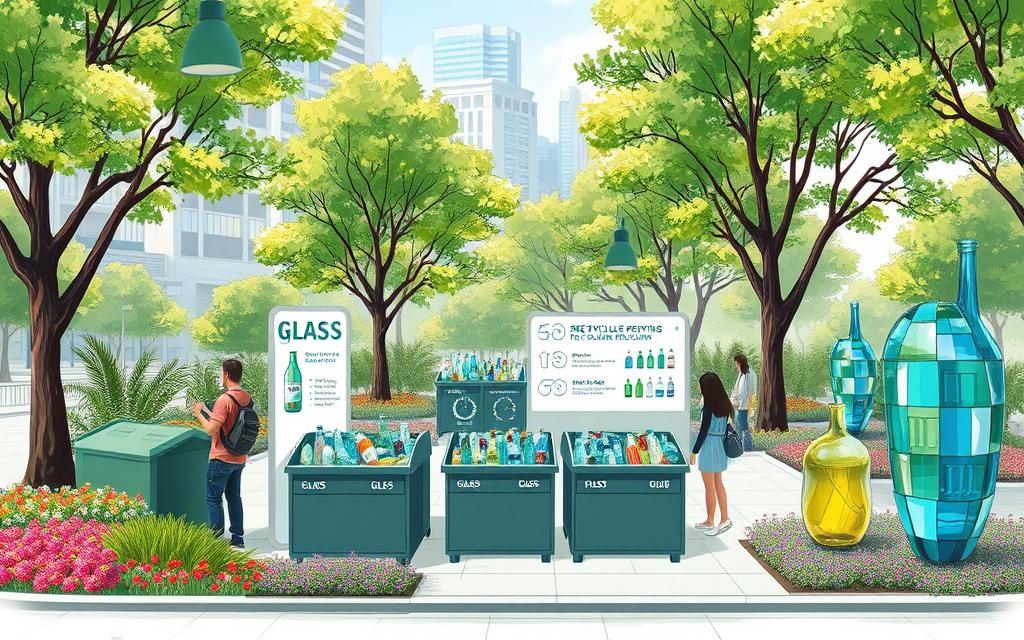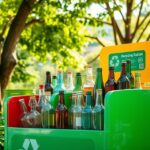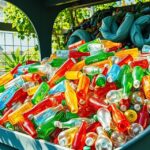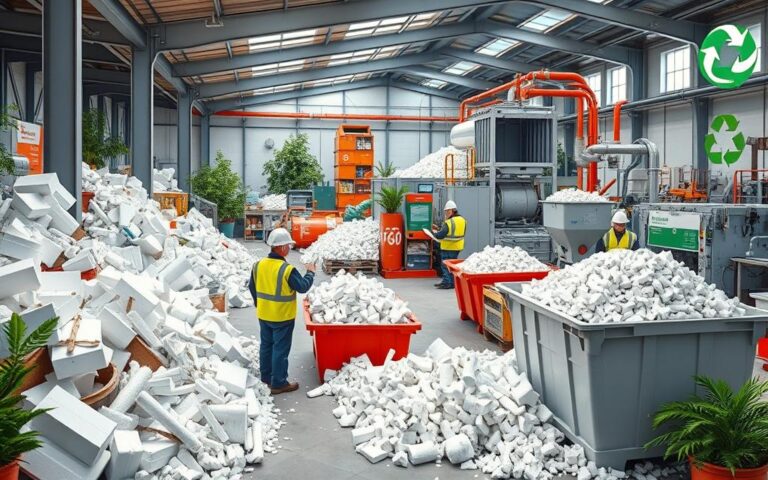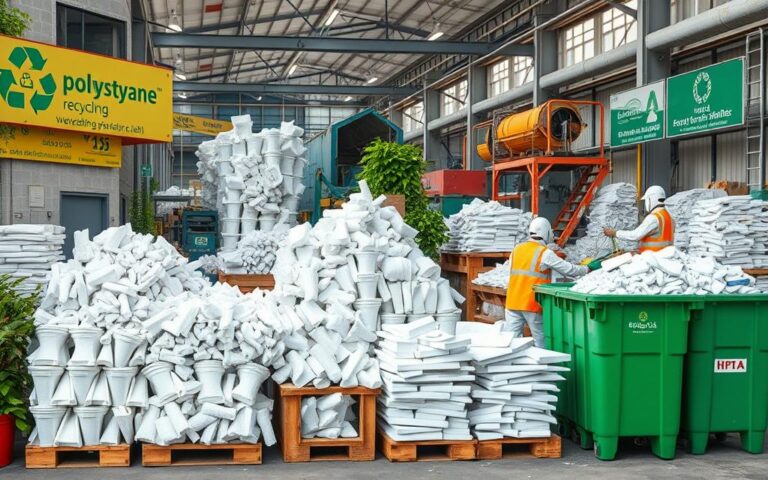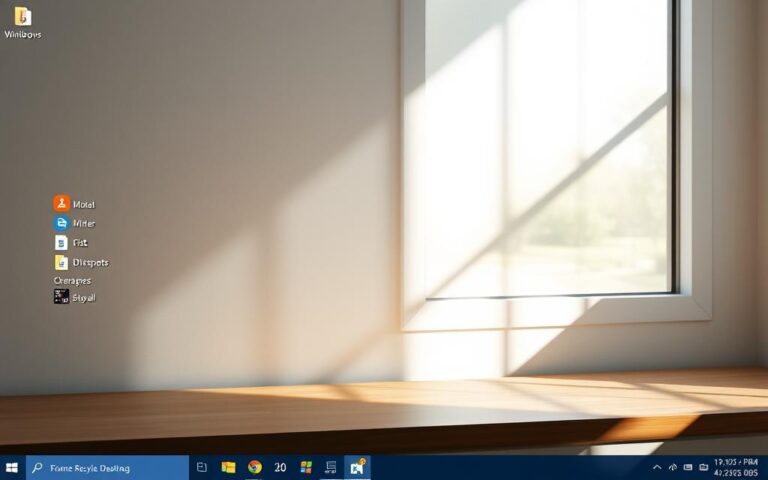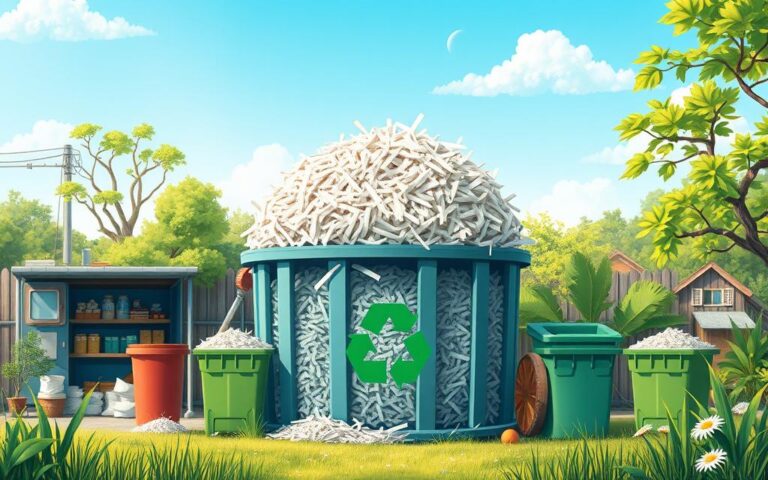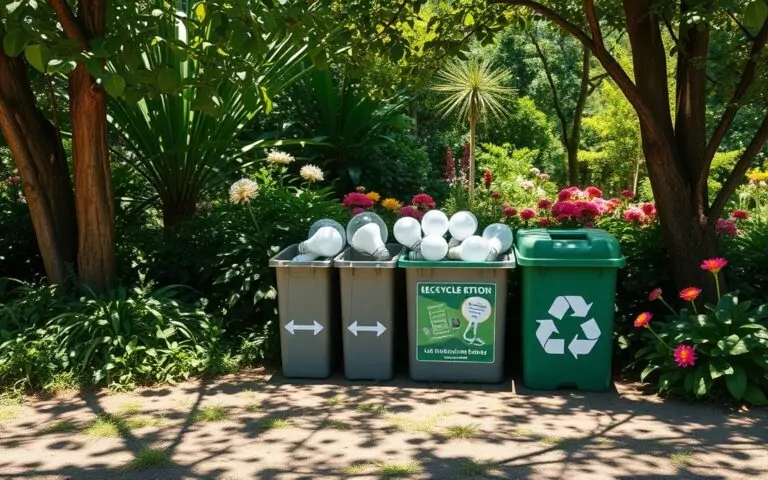Where Can I Recycle Glass Near Me? Sustainable Options
Recycling glass is key to being eco-friendly and helping our planet. In Connecticut, it’s required to recycle glass. But often, this glass doesn’t get made into new items. Instead, it goes into landfills. Are you looking to recycle glass effectively? It’s important to know the good it does and how you can do it.
Recycling just one tonne of glass can save lots of natural resources. It saves over 1,300 pounds of sand and 410 pounds of soda ash. This also cuts down energy use and reduces carbon dioxide emissions. To make a difference, we can look into how to recycle glass in our own areas. By doing this, we move towards greener practices.
Understanding Glass Recycling
Glass recycling is vital for the environment. It helps us save energy and cut down waste. By recycling, we care for our planet and promote green habits.
Benefits of Recycling Glass
Recycling glass has many perks. It uses up to 30% less energy than making new glass. This saves resources like sand and reduces harmful emissions. Plus, recycled glass maintains its quality, making it great for new products.
What Types of Glass are Recyclable?
It’s important to know what glass can be recycled. We can recycle items like:
- Bottles
- Jars
These can be turned into new products if sorted right. Glass drop-off sites accept bottles and jars of all colours together. Yet, some glass types, like drinking glasses and windows, aren’t recyclable in usual programmes. They can mess with the recycling process. Always follow eco-friendly disposal rules to keep our communities clean and support recycling.
| Recyclable Glass Types | Non-Recyclable Glass Types |
|---|---|
| Bottles | Drinking glasses |
| Jars | Windows |
| Food containers | Ceramics |
Where Can I Recycle Glass Near Me?
Recycling glass helps our community become more sustainable. It’s important to know where you can recycle in your area. Look for local recycling centres, curbside collection services, and special drop-off sites for easy recycling.
Local Recycling Centres
Local recycling centres are key for recycling. For example, Baldwin County has over 30 spots for glass recycling. These centres take many items like aluminium, paper, cardboard, and some plastics, besides glass. They’re usually open from 8:00 AM to 5:00 PM, Monday to Saturday. For details, check out recycling resources.
Curbside Collection Services
Curbside collection makes recycling glass at home easy. Many places have this service. You just put your glass out like normal trash. Remember, there might be a schedule or a small fee. Check your local rules first.
Drop-off Locations in Your Area
Drop-off sites offer another way to recycle glass. Places like the Prattville Recycling Center take all sorts of glass. You’ll find bins at public spots, making it easy for everyone to help. Drop-off sites keep things clean and sorted, stopping contamination.
| Location | Types of Glass Accepted | Open Hours |
|---|---|---|
| Baldwin County Recycling Centre | Clear, green, amber | Mon-Sat, 8:00 AM – 5:00 PM |
| Prattville Recycling Center | Clear, green, amber | Mon-Sat, 8:00 AM – 5:00 PM |
| Volusia County Glass Drop-off Site | Clear, green, amber | Mon-Sat, 8:00 AM – 5:00 PM |
Common Misconceptions About Glass Recycling
Many people have wrong ideas about glass recycling. This leads to the wrong way of throwing away some items. It’s important to know what can and can’t be recycled. We want to clear up these misunderstandings, focusing on glass that you shouldn’t recycle.
What Glass Items Cannot Be Recycled?
Some glass items shouldn’t go into the recycling bin. Here’s a list of items you should leave out:
- Drinking glasses
- Ceramic dishware
- Mirrors
- Window panes
- Lightbulbs (including incandescent, halogen, and compact fluorescent)
- Broken glass
It’s key to remember that broken glass usually can’t be recycled. This is because it can damage new recycled glass. Many don’t accept common household glass items because of safety and processing issues.
The Truth About Drinking Glasses and Ceramics
Some folks think drinking glasses and ceramics can be recycled with bottles and jars. Sadly, these have different compositions and need different temperatures to melt. This makes recycling them harder.
Mirrors and eyeglasses also can’t be recycled easily. Mirrors have a reflective coating that’s hard to process. And it’s better to donate eyeglasses than to recycle them. This is due to a large surplus in the US.
By understanding these truths about glass recycling, we can make smarter choices about disposing of waste. Knowing what can’t be recycled helps with responsible recycling habits.
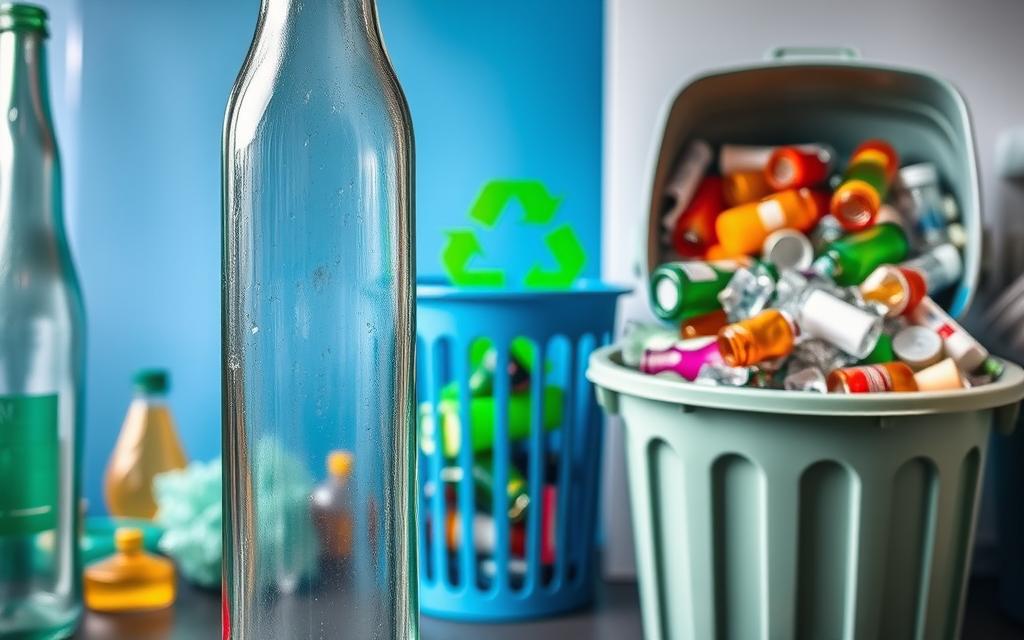
| Non-Recyclable Glass Items | Reason for Non-Recyclability |
|---|---|
| Drinking glasses | Different melting point and composition |
| Ceramics | Not compatible with glass recycling processes |
| Mirrors | Reflective coating complicates recycling |
| Window panes | Higher melting temperature required |
| Lightbulbs | Contains mercury and other hazards |
| Broken glass | Presents risks and processing issues |
Sustainable Practices for Glass Management
Glass management includes practices that support sustainability. This means preparing glass for recycling and finding other ways to use it. Knowing about these practices helps everyone play a part in lessening waste and saving resources.
How to Prepare Glass for Recycling
Getting glass ready for recycling is key to managing waste better. Important steps are:
- Clean glass containers well to get rid of food leftovers.
- Take off any lids or caps to avoid messing up the recycling process.
- Put the glass in the right recycling bins, especially where there’s separate collection for glass.
Doing these things aids in sustainable glass handling. It lessens the chance of waste going to landfills and helps recycling work better.
Alternatives to Disposal: Reuse and Upcycle
Reusing and upcycling glass not only makes them last longer. It also encourages being creative and sustainable. Some ideas are:
- Turn glass jars into storage, to organise, or as plant pots for herbs.
- Make decorative items like candle holders or vases from old glass.
- Join in community projects that make new things from waste, helping a circular economy.
Trying out these alternatives plays a big part in waste reduction. It shows how glass can be more than just thrown away.
| Practice | Description | Benefits |
|---|---|---|
| Preparing Glass for Recycling | Make sure glass containers are clean and have no lids before recycling. | Lowers contamination and makes recycling more effective. |
| Reusing Glass | Give glass jars and containers a new purpose as storage or decoration. | Makes products last longer and decreases waste. |
| Upcycling | Change old glass items into new, useful things. | Boosts creativity while cutting down on the need for new resources. |
Taking part in sustainable glass practices doesn’t just help the earth. It also leads to a more thoughtful way of dealing with consumption and managing waste.
Conclusion
Understanding the recycling of glass is key for promoting recycling and bettering sustainability. This article has talked about why recycling glass matters. It also covered the types of glass you can and cannot recycle, and how to manage glass waste well.
Recycling helps save resources and cuts down on pollution. This shows its good effects on our environment. There are many recycling options out there, like curbside collection and drop-off spots.
Every bit of glass recycling reduces landfill waste and supports a circular economy. This means materials get reused and repurposed. By doing this, we can greatly impact our community.
If you want to learn more about glass recycling and sustainability, check out this resource. By acting now, we can help future generations and create a cleaner, healthier world.
FAQ
Why is glass recycling important?
Recycling glass helps save natural resources. It uses up to 30% less energy than making new glass. This also cuts down on harmful emissions, making our planet cleaner.
What types of glass can I recycle?
You can recycle glass bottles and jars. Make sure to check your local rules. Some places might have different guidelines on what can be recycled.
How do I prepare glass for recycling?
First, clean your glass items well, removing any leftovers. Don’t forget to remove lids or caps to avoid contamination.
Are there any glass items that I cannot recycle?
Yes, there are. Items like drinking glasses, ceramics, mirrors, and window panes can’t usually go in the recycle bin. You should throw them away with your other trash.
Where can I find local recycling centres?
Local recycling centres are often found in cities and towns. Check your council’s website or use online recycling locator tools to find them.
Is curbside collection available for glass recycling?
Yes, some places offer curbside glass recycling with regular trash pick-up. There might be small fees for handling.
What are some alternatives to glass disposal?
Instead of throwing glass away, try reusing it for storage or decoration. Upcycling glass into new items is another great way to be sustainable and cut waste.
How can I be sure I am recycling correctly?
To recycle right, always look up your local rules. Avoid putting non-recyclables with your recycling. Stay updated on what you can and cannot recycle.

